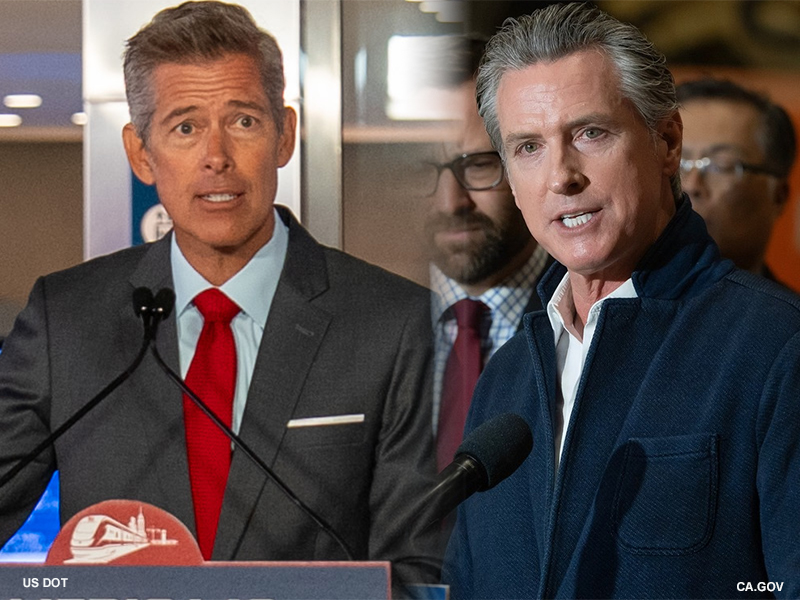First, there was a warning. Now, the U.S. Department of Transportation is taking action.
Transportation Secretary Sean Duffy announced that the Federal Motor Carrier Safety Administration will withhold about $40.7 million from California for not complying with the agency’s English-proficiency standards.
“I put states on notice this summer,” Duffy said in a news release. “Enforce the Trump administration’s English-language requirements, or the checks stop coming. California is the only state in the nation that refuses to ensure big rig drivers can read our road signs and communicate with law enforcement. This is a fundamental safety issue that impacts you and your family on America’s roads.”
Specifically, FMCSA will pull $40.7 million of funding from the Motor Carrier Safety Assistance Program that had been awarded to California. The funds are provided to states for such activities as roadside inspections, traffic enforcement, safety audits of trucking companies and public education campaigns. The DOT noted that states must adopt and enforce laws, regulations, standards and orders on commercial motor vehicle safety to remain eligible for the funds.
The DOT said the funding can be restored if California begins conducting English-proficiency assessments of commercial motor vehicle drivers and issuing out-of-service orders to those who fail.
California Gov. Gavin Newsom’s Press Office X account responded by saying that California CDL holders had a fatal crash rate nearly 40% lower than the national average.
Additionally, Newsom included California’s letter to DOT sent on Sept. 25.
“California has complied and will continue to comply with applicable federal laws and regulations,” the letter stated. “Accordingly, California has met the qualifying conditions for Motor Carrier Safety Assistance Program funding.”
The warning
On Aug. 26, Duffy held a news conference and threatened action against states that don’t comply with English-proficiency regulations for commercial motor vehicle drivers.
Duffy specifically called out Washington, California and New Mexico for not enforcing the regs, saying the states had 30 days to come into compliance.
“Hopefully in the next 30 days, we won’t have to withhold any money from them,” Duffy said. “But if they don’t come into compliance, we will start with withholding this money and then we will take additional steps to guarantee compliance. Just to be clear, this isn’t about having some obscure rule that we want them to comply with about truck drivers being able to speak English proficiently. This is about keeping people safe on the road … We need to make sure that the people who are driving big rigs can understand the road signs, that they’ve been well-trained and when they’re stopped by law enforcement … they can effectively communicate …”
Now, the DOT says an investigation revealed that California has continued to defy the rule.
“Let me be clear – this is valuable money that should be going to the great men and women in California law enforcement, who we support,” Duffy said. “Gov. Newsom’s insistence on obstructing federal law has tied my hands.”
Safety concerns
The Owner-Operator Independent Drivers Association has called the lack of English proficiency among truck drivers a safety issue. Being able to read electronic highway signs and communicate with law enforcement is a must, the Association said.
OOIDA petitioned the Commercial Vehicle Safety Alliance in March to begin placing non-English -speaking drivers out of service and is supportive of the DOT’s efforts to enforce the longstanding regulation.
“OOIDA strongly supports Secretary Duffy’s action to enforce long-standing English-proficiency requirements for commercial drivers,” OOIDA President Todd Spencer said in August. “Basic English skills are critical for safely operating a commercial motor vehicle – reading road signs, following emergency instructions and communicating with law enforcement are not optional. The fatal crash in Florida this month tragically illustrates what’s at stake. Road signs save lives, but only when they’re understood. Operating an 80,000-pound vehicle without being able to read road signs isn’t just dangerous; it’s completely unacceptable.”
The Association also supports a bill recently introduced by Sen. Cynthia Lummis, R-Wyo., that would put President Donald Trump’s executive order on English proficiency into law.
Known as Connor’s law, S2991 was introduced on Oct. 8.
“Wyoming families and travelers deserve safe highways,” Lummis said in a news release. “I’m introducing this common-sense legislation to ensure commercial truck drivers operating heavy vehicles can simply read signs, understand traffic laws and communicate effectively with law enforcement and emergency responders. Wyoming is a critical interstate commerce hub, with I-80 as a major shipping corridor. Our challenging road conditions, including high winds, winter storms and mountains, demand clear communication between drivers and authorities. This legislation will correct the major mistake the Obama administration made in undermining these rules and will codify President Trump’s executive order to make our highways safer for all Americans.” LL

